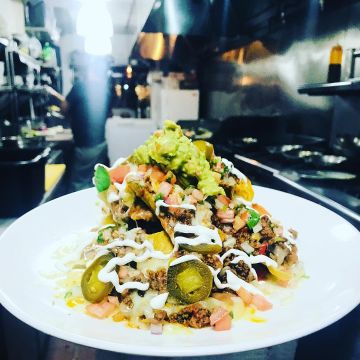Choose best mexican westchester NY restaurants for unforgettable cuisine
Is Mexican Food Healthy And Balanced? Unboxing the Nutritional Conveniences of Standard Active Ingredients
The inquiry of whether Mexican food is healthy and balanced welcomes an exploration of its traditional components. Beans and corn work as fundamental staples, rich in healthy protein and fiber. Avocados offer useful fats, while numerous natural herbs and flavors include flavor and health advantages - take out and delivery. Together, these parts create a tapestry of nourishment. However, the healthfulness of Mexican cuisine usually relies on preparation approaches and portion sizes. What role do these variables play in determining its general nutritional value?
The Power of Beans: Healthy Protein and Fiber-Rich Staples
Often neglected, beans offer as a keystone of Mexican cuisine, supplying a riches of dietary advantages. Rich in healthy protein, they are an excellent plant-based alternative for those seeking to satisfy their dietary healthy protein needs. This high protein content supports muscle repair service and development, making beans vital for both vegetarians and meat-eaters alike. Additionally, beans are an outstanding source of dietary fiber, which helps in digestion and promotes a sensation of volume, possibly aiding with weight monitoring.
The selection of beans made use of in Mexican recipes, such as black beans, pinto beans, and kidney beans, adds to a varied flavor profile and can enhance dishes nutritionally. Beans are low in fat and contain essential vitamins and minerals, consisting of folate, magnesium, and iron. With each other, these qualities make beans an important ingredient, delivering both sustenance and food in conventional Mexican price.

Corn: a Versatile Grain With Nutritional Conveniences
Corn stands apart as a functional grain fundamental to Mexican food, celebrated not only for its cooking applications but likewise for its impressive dietary profile. As a key component in recipes like tortillas, tamales, and pozole, corn provides necessary nutrients that add to a balanced diet. Rich in carbohydrates, it works as a significant power source, while likewise being low in fat, making it a favorable option for different nutritional needs.
Corn is a great resource of nutritional fiber, which aids in digestion and advertises satiation. It has significant amounts of vitamins such as B-complex vitamins, which are crucial for basal metabolism. The visibility of anti-oxidants, particularly carotenoids, adds to general health and wellness by reducing oxidative anxiety. Furthermore, corn is gluten-free, providing to those with gluten level of sensitivities. Overall, the nutritional benefits of corn highlight its value in standard Mexican food and its duty in a healthy and balanced diet plan.
Avocados: Healthy And Balanced Fats and Nutrients in Every Bite
Avocados play a substantial role in Mexican cuisine, enhancing dishes with their creamy texture and rich taste. Past their cooking charm, avocados are celebrated for their outstanding nutritional profile. They are a rich resource of healthy and balanced monounsaturated fats, which can assist lower bad cholesterol levels and support heart health. Additionally, avocados are loaded with essential vitamins and minerals, consisting of potassium, vitamin E, and B vitamins, adding to overall wellness.
The high fiber web content in avocados help digestion and advertises satiation, making them a beneficial enhancement to any kind of dish. Their special nutrient structure can also sustain skin health and wellness and supply anti-inflammatory benefits. Integrating avocados right into standard Mexican meals or enjoying them as a asian restaurant standalone treat can improve both flavor and nutrition, showing why they are a precious staple anonymous in Mexican cuisine. On the whole, avocados supply a tasty way to delight in healthy fats and crucial nutrients in every bite.

Natural Herbs and flavors: Flavorful Health Boosters
While enjoying the abundant tastes of Mexican cuisine, one can not neglect the essential function that spices and natural herbs play in enhancing both preference and health and wellness. Components such as oregano, chili, and cilantro peppers not just contribute to the dynamic flavor account yet also supply substantial wellness benefits. For instance, cilantro is understood for its detoxing residential properties, aiding to eliminate heavy metals from the body, while oregano is packed with antioxidants and has anti-inflammatory results.
Chili peppers, a staple in numerous Mexican meals, consist of capsaicin, which has actually been linked to enhanced metabolic process and discomfort alleviation. Furthermore, flavors like cumin and coriander assistance food digestion and may help in blood glucose policy. Integrating these tasty health and wellness boosters into meals not only enhances the cooking experience yet also promotes total health, making Mexican food not simply tasty, however likewise nutritionally helpful.
Conventional Cooking Methods: Enhancing Nourishment and Taste
Standard food preparation techniques in Mexican cuisine play a necessary role in improving both nutrition and flavor, as they commonly focus on classic methods and fresh components. Techniques such as nixtamalization, where corn is saturated and cooked in an alkaline solution, not just enhance the nutrient profile of tortillas yet likewise Related Site enhance their digestibility - hand crafted margarita. In addition, using slow-moving food preparation techniques, like cooking or braising, permits flavors to fuse perfectly while maintaining the integrity of the components

Often Asked Questions
Are Mexican Food Portions Generally Larger Than Various Other Foods?
Mexican food parts are frequently larger than those of numerous other foods. This particular reflects typical eating practices, emphasizing common sharing and hearty meals, which can lead to an extra considerable serving dimension in general.
How Does the Prep Work Method Affect Healthfulness of Mexican Food?
Prep work techniques greatly influence the healthiness of Mexican food. Techniques such as cooking or steaming preserve nutrients, while frying can increase undesirable fat content. Options of ingredients and cooking designs eventually establish general nutritional worth.
Can Mexican Food Be Customized for Certain Dietary Limitations?
Mexican food can certainly be customized for specific nutritional restrictions. Alternatives, such as making use of corn tortillas for gluten-free diet plans or including more vegetables, make it possible for people to appreciate conventional tastes while accommodating different dietary needs.
What Are Typical Misunderstandings Concerning Mexican Food and Health?
Typical false impressions about Mexican food include the idea that it is naturally harmful, excessively zesty, and solely concentrated on fats. In truth, typical dishes typically include nourishing ingredients and can be tailored to different nutritional demands.
Exist Healthier Options at Mexican Restaurants?
Healthier choices at Mexican dining establishments usually include grilled meats, beans, and fresh vegetables. Selecting dishes that highlight entire components and avoiding hefty sauces can bring about a more healthy eating experience, promoting overall well-being.
The variety of beans used in Mexican dishes, such as black beans, pinto beans, and kidney beans, contributes to a varied taste account and can boost dishes nutritionally. Avocados play a significant role in Mexican food, enhancing recipes with their velvety structure and abundant taste. Including avocados right into standard Mexican meals or enjoying them as a standalone snack can boost both flavor and nourishment, showing why they are a cherished staple in Mexican food. While taking pleasure in the rich flavors of Mexican food, one can not overlook the essential role that spices and natural herbs play in boosting both taste and health and wellness. Conventional cooking methods in Mexican food play a necessary duty in boosting both nourishment and flavor, as they frequently prioritize fresh ingredients and classic methods.